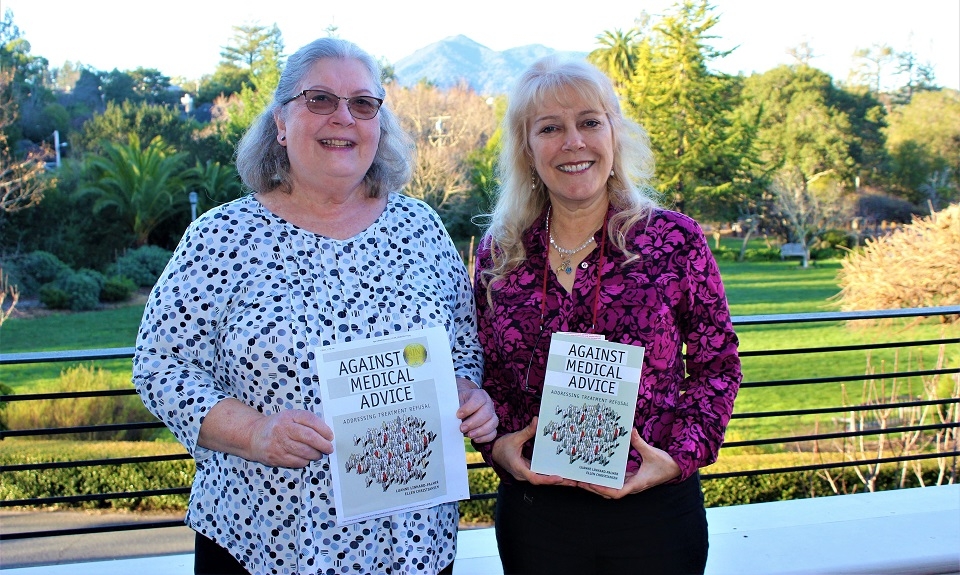Breadcrumbs
- News
- News Archive
- Guide To Medical Treatment Refusals Earns Book Of Year Award From AJN

In their book Against Medical Advice: Addressing Treatment Refusal, two Dominican University of California nursing professors explore the many medical, social, cultural and religious factors that lead patients and families to refuse medical treatment.
The book has just been recognized as one of the “most valuable titles published in 2022” by the American Journal of Nursing. The journal named Against Medical Advice to its Book of the Year list, with first-place honors in both the Child Health and History and the Public Policy categories.
In Against Medical Advice, authors Dr. Luanne Linnard-Palmer, professor of nursing, and Dr. Ellen Christiansen, adjunct associate professor of nursing in the School of Health and Natural Sciences, outline strategies and step-by-step examples to guide healthcare professionals through the complex and diverse ethical dilemmas of treatment refusal.
The number of patients refusing or limiting medical treatment due to social, religious, or cultural beliefs is increasing in healthcare settings. This occurrence can plunge the healthcare providers, the families, and the patients into difficult, emotionally-charged conversations, say the authors examining many of the medical, legal, social, cultural, and religious factors associated with treatment refusals.
“A medical professional’s ability to effectively communicate with patients – particularly with culturally and ethnically diverse patients – is critical in today’s healthcare settings,” Linnard-Palmer says.
“Healthcare professionals must be aware of the magnitude of refusal scenarios and that the very best way to assist individuals who refuse treatment and vaccines is to be prepared for conversations, listen intently, educate on alternatives (if available), and share known consequences of refusal.”
As immigration rates and urban populations grow, cultural competency and sensitivity to a variety of religious and cultural traditions is essential for caregivers. Linnard-Palmer and Christiansen note that it is critical that medical professionals are culturally literate and adept at effectively communicating with culturally and ethnically diverse patients in situations where key healthcare decisions must be made.
The book outlines the reasons patients refuse treatment and vaccines; examines legal and ethical implications of refusal scenarios; provides examples of professional interventions; guides staff facing parental refusal of pediatric vaccines or medical treatments, and outlines religious doctrines and cultural norms whose traditions influence medical treatment decisions.
Earlier studies by Linnard-Palmer, who is a Pediatric Educational Consultant and Pediatric Clinical Nurse at both Sutter Health's California Pacific Medical Center and Stanford Children’s Health, show that culture and religion influence both communication and decision making, often creating an ethical dilemma and a ‘storm’ between families and healthcare providers.
Healthcare personnel, she notes, need to learn and practice cross-cultural communication. While some hospitals do require annual competency for nurses and others in the healthcare team, these might only include about an hour or two of information pertaining to cultural sensitivity, Linnard-Palmer said.
In a 2012 study, based on the results of two surveys distributed to more than 750 professional nurses and nursing students throughout the Bay Area, Linnard-Palmer noted that when confronted with the challenge of providing care to patients with different belief structures or worldviews, health care providers often feel ill-equipped to bridge communication difficulties resulting from cultural and ethnic diversity.
Miscommunication is a major contributor to medical errors, and errors will increase as long as there are barriers in cultural communication, Linnard-Palmer says. “Unless cultural differences are appreciated, understood, and addressed in healthcare settings and in professional education curricula, treatment errors, mismanaged care, and health disparities will continue to persist or increase.”
Different cultures present different challenges to the healthcare team and health care negotiations can be influenced by several dimensions. For example, understanding the differences between high-context cultures, in which communication is indirect and implicit, and low-context cultures in which communication is direct and unambiguous is critical. Gaining a proper understanding of nonverbal communication also is critical in cross-cultural settings.
Linnard-Palmer has completed several ethnographic studies and articles on religious and cultural doctrines that lead a parent to refuse medical care for an acutely ill child. In her 2006 book When Parents Say No: Religious and Cultural Influences on Pediatric Healthcare Treatment, she identified 31 religions in the United States that limit, delay, or refuse medical care.
Photo above of Dr. Ellen Christiansen (left) and Dr. Luanne Linnard-Palmer with copy of Against Medical Advice book.